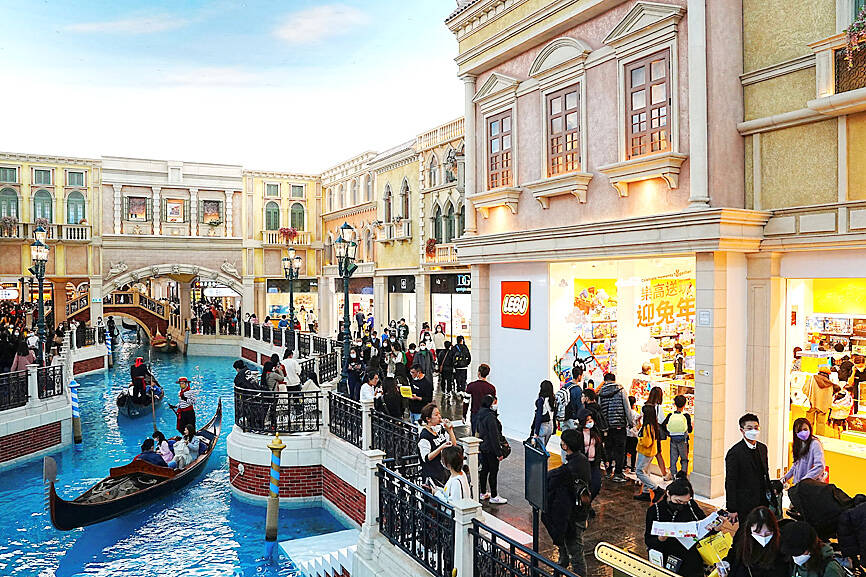Macau casinos have been forced to remove thousands of hotel rooms from booking systems and cut back on guest services such as housekeeping, as a labor shortage leaves the gambling hub struggling to cater to a surge of tourists from China.
Some five-star hotels in Macau’s casinos only have fewer than half of their rooms available for booking, people familiar with the situation said.
Another operator has about 20 percent of its rooms out of commission, Macau Responsible Gaming Association president Billy Song (宋偉傑) said.

Photo: Reuters
The lack of service staff is so severe that some hotels have reduced the frequency of maid services, who clean rooms only after customers check out, he said.
While casino operators hope their hotels can reach near capacity by the summer, Macau’s slow hiring process for foreign workers is a major hurdle to fully reopening now that COVID-19 border curbs and restrictions have ended, Song said.
“We didn’t expect the reopening would come so fast, so everybody’s struck unprepared,” Song said in an interview.
“After three dismal years, we all want to make the best out of this year, but now that customers have come, we don’t have enough capacity to receive them,” he said.
Capturing an initial wave of tourists is crucial for Macau’s recovery after ceding its crown as the world’s largest gambling hub to Las Vegas during the COVID-19 pandemic as China shuttered its borders.
The labor shortage is triggering room-rate inflation and a drop in the quality of hospitality, both of which could deter visitors.
It could also further strain casino operators, which saw a combined loss of US$1.6 billion during the pandemic. A crackdown on high-rollers and their agents has already scuppered Macau’s VIP industry, which contributed half of the city’s gambling revenue before COVID-19.
Casinos are also facing tighter government control after an overhaul of local gaming laws gave authorities increased oversight of their operations, including overall performance and major financial decisions.
Most Macau casino jobs — including dealers, floor managers and accountants — are reserved for locals.
The most urgent workforce needs are service staff such as waiters, cleaners and receptionists at hotels and restaurants, Song said.
Those jobs were largely shunned by locals and filled by foreign workers before the pandemic — many of them from mainland China and Southeast Asia, he said.
More than 44,000 non-local employees have left Macau since early 2020, leaving a gaping hole in the workforce as China’s end of its “zero COVID” policy has fueled a travel boom not seen since 2019.
The gaming hub relies on the mainland and Hong Kong for more than 90 percent of its visitors.
At the same time, hotel prices are quickly rising. In February, Macau’s average hotel room price was about US$150 — already 80 percent of its pre-COVID level — while visitation was only 45 percent of what it was in 2019, Macau Government Tourism Office data showed.

TAKING STOCK: A Taiwanese cookware firm in Vietnam urged customers to assess inventory or place orders early so shipments can reach the US while tariffs are paused Taiwanese businesses in Vietnam are exploring alternatives after the White House imposed a 46 percent import duty on Vietnamese goods, following US President Donald Trump’s announcement of “reciprocal” tariffs on the US’ trading partners. Lo Shih-liang (羅世良), chairman of Brico Industry Co (裕茂工業), a Taiwanese company that manufactures cast iron cookware and stove components in Vietnam, said that more than 40 percent of his business was tied to the US market, describing the constant US policy shifts as an emotional roller coaster. “I work during the day and stay up all night watching the news. I’ve been following US news until 3am

UNCERTAINTY: Innolux activated a stringent supply chain management mechanism, as it did during the COVID-19 pandemic, to ensure optimal inventory levels for customers Flat-panel display makers AUO Corp (友達) and Innolux Corp (群創) yesterday said that about 12 to 20 percent of their display business is at risk of potential US tariffs and that they would relocate production or shipment destinations to mitigate the levies’ effects. US tariffs would have a direct impact of US$200 million on AUO’s revenue, company chairman Paul Peng (彭雙浪) told reporters on the sidelines of the Touch Taiwan trade show in Taipei yesterday. That would make up about 12 percent of the company’s overall revenue. To cope with the tariff uncertainty, AUO plans to allocate its production to manufacturing facilities in

Six years ago, LVMH’s billionaire CEO Bernard Arnault and US President Donald Trump cut the blue ribbon on a factory in rural Texas that would make designer handbags for Louis Vuitton, one of the world’s best-known luxury brands. However, since the high-profile opening, the factory has faced a host of problems limiting production, 11 former Louis Vuitton employees said. The site has consistently ranked among the worst-performing for Louis Vuitton globally, “significantly” underperforming other facilities, said three former Louis Vuitton workers and a senior industry source, who cited internal rankings shared with staff. The plant’s problems — which have not

COLLABORATION: Given Taiwan’s key position in global supply chains, the US firm is discussing strategies with local partners and clients to deal with global uncertainties Advanced Micro Devices Inc (AMD) yesterday said it is meeting with local ecosystem partners, including Taiwan Semiconductor Manufacturing Co (TSMC, 台積電), to discuss strategies, including long-term manufacturing, to navigate uncertainties such as US tariffs, as Taiwan occupies an important position in global supply chains. AMD chief executive officer Lisa Su (蘇姿丰) told reporters that Taiwan is an important part of the chip designer’s ecosystem and she is discussing with partners and customers in Taiwan to forge strong collaborations on different areas during this critical period. AMD has just become the first artificial-intelligence (AI) server chip customer of TSMC to utilize its advanced